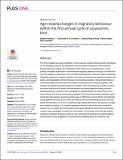Age-related changes in migratory behaviour within the first annual cycle of a passerine bird
Abstract
First time migrants (juveniles hereafter) of many species migrate without specific knowledge of non-breeding locations, but experience may aid adults in timing and route decisions because they can migrate more efficiently to their previous non-breeding sites. Consequently, we expect a transition to more efficient migratory behaviour with age, but when and how this happens is little known. We used light-level geolocator data from Cyprus wheatears Oenanthe cypriaca to compare migration timing and route directness between juveniles and adults, and repeatability of their timing and non-breeding locations. We predicted that juveniles would depart and arrive later than adults for both autumn and spring migration; that duration of migration would be greater for juveniles; that routes taken by juveniles would be less direct than those for adults; and that autumn and spring departure timing, and non-breeding locations, would be more repeatable for adults between two years than for juveniles between their first and subsequent migration. We found that juveniles departed significantly later than adults in autumn but there was no difference in arrival timing, and although spring departure timings did not differ, juveniles arrived on the breeding grounds later than adults. Nevertheless, we found no significant age-related difference in the duration of migration in autumn or spring. Yet, juvenile migrations were less direct than those of adults in autumn, but not spring. We found evidence that spring departure timing and non-breeding locations were repeatable for adults but not juveniles. Our findings show that age-related changes in migratory behaviour begin to occur during the first annual cycle demonstrating the potential for early adaptation to environmental variability within an individual’s life.
Citation
Patchett , R , Kirschel , A N G , Robins King , J , Styles , P & Cresswell , W 2022 , ' Age-related changes in migratory behaviour within the first annual cycle of a passerine bird ' , PLoS One , vol. 17 , no. 10 , e0273686 . https://doi.org/10.1371/journal.pone.0273686
Publication
PLoS One
Status
Peer reviewed
ISSN
1932-6203Type
Journal article
Description
Funding: Funding was awarded to WC from the A.P. Leventis Conservation Foundation.Collections
Items in the St Andrews Research Repository are protected by copyright, with all rights reserved, unless otherwise indicated.

